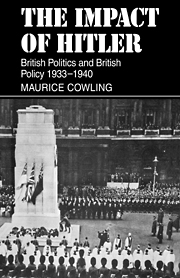Book contents
- Frontmatter
- Contents
- Preface
- Dedication
- Introduction
- PROLOGUE: THE UNFOLDING OF THE PROBLEM
- PART I THE NEW DEPARTURE
- The failure of the League of Nations
- Chamberlain and Eden
- Chamberlain and Hitler
- PART II THE OPPOSITION
- PART III THE EFFECT
- PART IV THE POLITICS OF EASY VICTORY
- Conclusion
- Appendix: the actors
- Bibliography
- Notes
- Index
The failure of the League of Nations
Published online by Cambridge University Press: 19 October 2009
- Frontmatter
- Contents
- Preface
- Dedication
- Introduction
- PROLOGUE: THE UNFOLDING OF THE PROBLEM
- PART I THE NEW DEPARTURE
- The failure of the League of Nations
- Chamberlain and Eden
- Chamberlain and Hitler
- PART II THE OPPOSITION
- PART III THE EFFECT
- PART IV THE POLITICS OF EASY VICTORY
- Conclusion
- Appendix: the actors
- Bibliography
- Notes
- Index
Summary
‘I have never known anyone in anything like Eden's position who has achieved such universal approval’.
Cecil to Baldwin, June 6 1935‘I was sitting next to Neville as hostess of the 1900 Club and was chuckling with delight at his pronouncement. I do hope it will achieve the desired result, though I confess I should like it to do even more, as for some time past I have thought that Anthony is a great danger to European peace’.
Lady Londonderry to Hailsham, June 18 1936, Londonderry MSS.‘Eden ha[s] put his country in a position where she sustained the greatest diplomatic reverse since Bismarck in similar circumstances had called Palmerston's bluff in the matter of Schleswig-Holstein…Further damage was done when Russia proved by her action in Spain, that she was not a good European as Mr Eden had assured the world was the case’.
Petrie, Lords of the Inland Sea (1937) pp. 272–6The election of 1935 restored much that the government had lost in 1934. Labour did well in London and parts of the North but realised none of its larger expectations. Liberals, except when supported by the Conservative party, did badly. Even Conservative support could not rescue Malcolm and Ramsay Macdonald who lost Bassetlaw and Seaham respectively. Though only a third of the qualified electors voted Conservative, there was a bigger majority than had been expected and the prospect of a simple struggle between Labour on the one hand and a thinly disguised Conservative party on the other.
Within six weeks Conservative ‘centrality’ had been destroyed as the ‘betrayal’ of the League became the government's ‘failure’ and the occasion for onslaughts on its integrity.
- Type
- Chapter
- Information
- The Impact of HitlerBritish Politics and British Policy 1933-1940, pp. 97 - 142Publisher: Cambridge University PressPrint publication year: 1975



